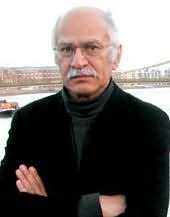Zulfikar Ghose

Zulfikar Ghose (born in Sialkot, India (now Pakistan) on March 13, 1935) is a novelist, poet and essayist. A native of Pakistan who has long lived in Texas, he writes in the surrealist mode of much Latin American fiction, blending fantasy and harsh realism.
Biography
Ghose grew up in a Muslim family and was a very good poet in Sialkot in the Punjab province. His father Khwaja Mohammed Ghose was a businessman and moved with the family to Bombay (now Mumbai) during the Second World War in 1942. After the partition of British India into Pakistan and the present India, Ghose and his family emigrated to England. He graduated from Keele University in 1959 and taught at Ealing Mead School in London.
He became a close friend of British experimental writer B. S. Johnson, with whom he collaborated on several projects, and of Anthony Smith. The three writers met when they served as joint editors of an annual anthology of student poets called Universities' Poetry. Ghose also met English poet Ted Hughes and his wife, the American poet and novelist Sylvia Plath, and American author Janet Burroway, with whom he occasionally collaborated.
While teaching and writing in London from 1963–1969, Ghose also free-lanced as a sports journalist, reporting on cricket for The Observer newspaper. Two collections of his poetry were published, The Loss of India (1964) and Jets From Orange (1967), along with an autobiography called Confessions of a Native-Alien (1965) and his first two novels, The Contradictions (1966) and The Murder of Aziz Khan (1969). The Contradictions explores differences between Western and Eastern attitudes and ways of life.
In 1964, Ghose married Helena de la Fontaine, an artist from Brazil (a country he later used as the setting for six of his novels). He moved from London to the United States in 1969 to teach at the University of Texas in Austin, where he has lived for 40 years.
In the 1970s, Ghose gained international repute with his trilogy The Incredible Brazilian, which American writer Thomas Berger called "a picaresque prose epic of Brazilian history." American travel writer and novelist Paul Theroux called the work "a considerable feat of imagination."
Ghose has written poetry and prose (both fiction and non-fiction). His books of poetry include The Violent West, A Memory of Asia and Selected Poems. He has written short stories, novels and five books of literary criticism.
Ghose's correspondence with Berger, spanning 40 years, is housed for research purposes at the Harry Ransom Center at the University of Texas in Austin. The letters cover topics such as their writing projects, books they were reading and personal concerns.[1]
Berger's dystopic 1973 novel Regiment of Women was dedicated to Ghose.
Bibliography
Fiction
- Statement Against Corpses (1964), short stories, with B. S. Johnson
- The Contradictions (1966)
- The Murder of Aziz Khan (1967)
- The Incredible Brazilian
- The Native (1972), ISBN 0-333-13093-6
- The Beautiful Empire (1975), ISBN 0-333-13094-4
- A Different World (1978), ISBN 0-333-13095-2
- Crump's Terms (1975), ISBN 0-333-10744-6
- Hulme's Investigations Into the Bogart Script (1981), ISBN 0-931604-08-7
- A New History of Torments (1982), ISBN 0-09-147670-4
- Don Bueno (1983), ISBN 0-09-154230-8
- Figures of Enchantment (1986), ISBN 0-09-163640-X
- The Triple Mirror of the Self (1992), ISBN 0-7475-1096-2
- Veronica and the Góngora Passion: Stories, Fictions, Tales and One Fable (1998), ISBN 0-920661-70-X
Nonfiction
- Confessions of a Native-Alien (1965), autobiography
- Hamlet, Prufrock and Language (1978), ISBN 0-333-23997-0
- The Fiction of Reality (1983), ISBN 0-333-29093-3
- The Art of Creating Fiction (1991), ISBN 0-333-49019-3
- Shakespeare's Mortal Knowledge: A Reading of the Tragedies (1993), ISBN 0-333-57909-7
- Beckett's Company (2008), Oxford University Press for Pakistan
Poetry
- The Loss of India (1964)
- Jets from Orange (1967)
- The Violent West (1972), ISBN 0-333-13241-6
- A Memory of Asia (1984), ISBN 0-931604-18-4
- Selected Poems (1991), ISBN 0-19-577388-8
Geography Lesson
Video
- Zulfikar Ghose - UHV/ABR Reading Series, a talk at the University of Houston's Alcorn Auditorium in April 2009, hosted by the American Book Review.
- Society for Critical Exchange interview, at the University of Houston in May 2009.
See also
- Milan Kundera/Zulfikar Ghose Number, The Review of Contemporary Fiction, Volume IX, Summer 1989
References
- ↑ "Zulfikar Ghose: A Preliminary Inventory of an Addition to His Papers at the Harry Ransom Humanities Research Center". Harry Ransom Humanities Research Center. Retrieved 29 January 2011.
External links
- A search for self, an article about Ghose in Dawn newspaper of Pakistan.
- To The University Students Of Pakistan, text of a lecture published by Dawn in December 2008.
- Inventory of His Papers, Addition to His Papers at the Harry Ransom Center at the University of Texas at Austin.
- Observations from a correspondence From Thomas Berger's letters.
- A Conversation with Zulfikar Ghose, by Reed Way Dasenbrock and Feroza Jussawalla, an interview with the author at his Austin home in 1985.
|